Related Research Articles
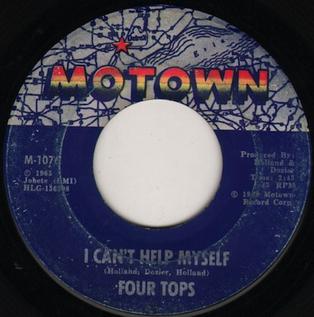
"I Can't Help Myself" is a 1965 song recorded by the Four Tops for the Motown label.

"Enjoy Yourself" is a song recorded by the Jacksons and released as a single in 1976. Featuring Michael and Jackie Jackson on lead vocals, it was the first single for the group since they departed from Motown earlier that year. The song peaked at number 6 on the US Billboard Hot 100 songs chart on February 19, 1977. On other US charts, "Enjoy Yourself" peaked at number 2 on the Hot Soul Singles chart and number 33 on the National Disco Action Top 40 chart. On February 14, 1989, it became the group's second single to be certified Platinum by the Recording Industry Association of America (RIAA) in the United States. It was the group's first song to feature new member Randy Jackson, who replaced Jermaine Jackson when he decided to stay at Motown after his brothers left.
C.J. & Company was a disco group from Detroit, Michigan. They were the partnership of producers Dennis Coffey and Mike Theodore. Their highest charting single in the US was "Devil's Gun", which reached #36 on the Billboard pop chart, spending 29 weeks on the HOT 100. It wound up being the #100 song of the year on the Billboard's year end charts,, and #2 on the R&B chart in 1977. It also peaked at #43 in the UK Singles Chart. That song, along with "We Got Our Own Thing" and "Sure Can't Go to the Moon," hit #1 for five weeks on the Hot Dance Music/Club Play chart.
"He's a Pretender" is a 1983 song written by Gary Goetzman (BMI) and Mike Piccirillo (BMI). It was originally recorded by R&B female group High Inergy. This was the lead single of their last album Groove Patrol, before disbanding in 1984, and it peaked at #82 in the Billboard Hot 100, #62 on the Black Singles charts. On the US, Dance/Disco Top 80 chart, "He's a Pretender" went to #25.

"Can't Stop" is a song performed by After 7, issued as the fourth single from the group's eponymous debut album. It is the group's highest-charting single, peaking at No. 6 on the Billboard Hot 100 in 1990. The song became the group's second number-one R&B single, and peaked at No. 25 on the dance chart.

Belle Epoque was the name of a female vocal trio, based in Paris, France. The group first rose to popularity during the late 1970s with a disco remake of the song "Black Is Black", originally a hit in 1966 for the Spanish group Los Bravos.

Pamala Stanley is an American disco and Hi-NRG singer from Philadelphia, Pennsylvania, United States. She scored several dance/club hits from the late 1970s to the late 1980s. She is the sister of folk-pop recording artist and singer-songwriter James Lee Stanley.
"Disco Nights (Rock-Freak)" is a song written by Emanuel LeBlanc, Herb Lane, Keith Crier and Paul Service and performed by American band GQ, from their 1979 debut studio album Disco Nights. The song was produced by Larkin Arnold, Beau Ray and Fleming Jimmy Simpson. The original title is "(Rock-Freaks) Disco / Boogie".

"Do It ('Til You're Satisfied)" is a popular song by funk group B. T. Express, written by songwriter Billy Nichols.
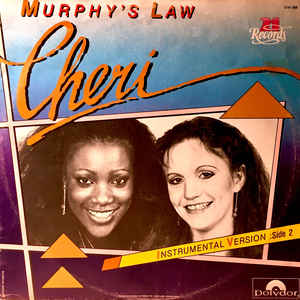
"Murphy's Law," is the name of a single by the Canadian/American female dance music duo Chéri.
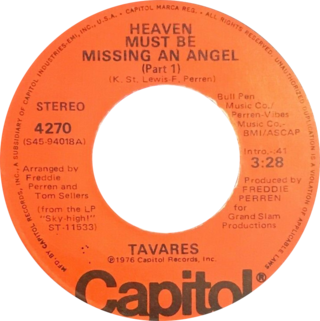
"Heaven Must Be Missing an Angel" is a disco song written by Freddie Perren and Keni St. Lewis. It was recorded by the American band Tavares in 1976. It was released as the first single from their fourth album, Sky High! (1976), and was split into two parts: the first part was 3 minutes and 28 seconds in length, while the second part was 3 minutes and 10 seconds. "Heaven Must Be Missing an Angel" was re-released in February 1986.

Let Me Be the One is a single by Exposé, released on May 15, 1987. It was written and produced by Lewis Martineé and appears on their debut album, Exposure. The lead vocals on the song were performed by Gioia Bruno.
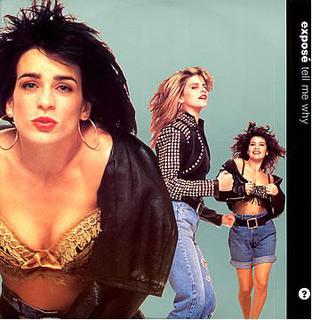
"Tell Me Why" is a single by Exposé, released on December 9, 1989. It was written and produced by Lewis Martineé. The song was included on Exposé's second album, What You Don't Know. Lead vocals on "Tell Me Why" were sung by Gioia Bruno.

"Keep On Dancin'" is the debut single by Gary's Gang, a disco group from Queens, New York. The song became successful in several countries in 1979.

"Circles" is a song by the American band Atlantic Starr, and the first single released from their 1982 album Brilliance. The single was the most successful for the group thus far, peaking at number two for two weeks on the Soul Singles chart and it also became their first single to hit the Billboard Hot 100, peaking at number 38. "Circles" was also Atlantic Starr's most successful single on the dance charts, peaking at number nine.
"Inside Love " is a song written by Kashif, and performed by American R&B singer George Benson.

"Black Is Black" is a song by the Spanish rock band Los Bravos, released in 1966 as the group's debut single for Decca Records. Produced by Ivor Raymonde, it reached number two in the UK, number four in the US, and number one in Canada. With the recording's success, Los Bravos became the first Spanish rock band to have an international hit single. A dance remix was released as a single in 1986.
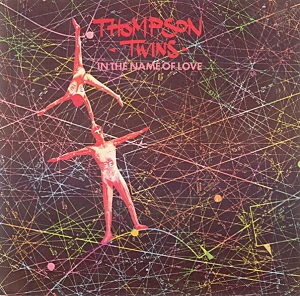
"In the Name of Love" is a 1982 single written and performed by British pop band Thompson Twins, at the time a septet. It was the first of twelve entries on the Billboard Dance chart for the group.
"Think It Over" is a song by American recording gospel/soul singer Cissy Houston and is the lead single from her 1978 third studio album Think It Over. The disco track was written by Houston, along with, Michael Zager and Alvin Fields. "Think It Over" was produced by Zager and peaked at #5 on the disco charts, as well as #32 on the Hot Soul Singles chart.

Corrado Rizza is an Italian DJ and producer.
References
- ↑ "Black Connection inside the UK Chart". OfficialCharts.com . Retrieved 2018-04-01.
- ↑ "Whitburn, Joel (2004), in Billboard's Hot Dance/disco 1974-2003, Billboard". Archived from the original on 2020-08-05. Retrieved 2018-04-01., p. 256 (2004)
- ↑ "Black Connection #25 Club Play-Artist and #21 Hot Single inside "The Year in Music" (1998), in Billboard - USA (magazine), p. 54 (Dec. 1998)". 26 December 1998 – 2 January 1999. Retrieved 2018-04-01.
- ↑ "Black Connection - inside the compilation - Essential Selection - Spring 1998 by Pete Tong". Discogs . Retrieved 2018-04-01.